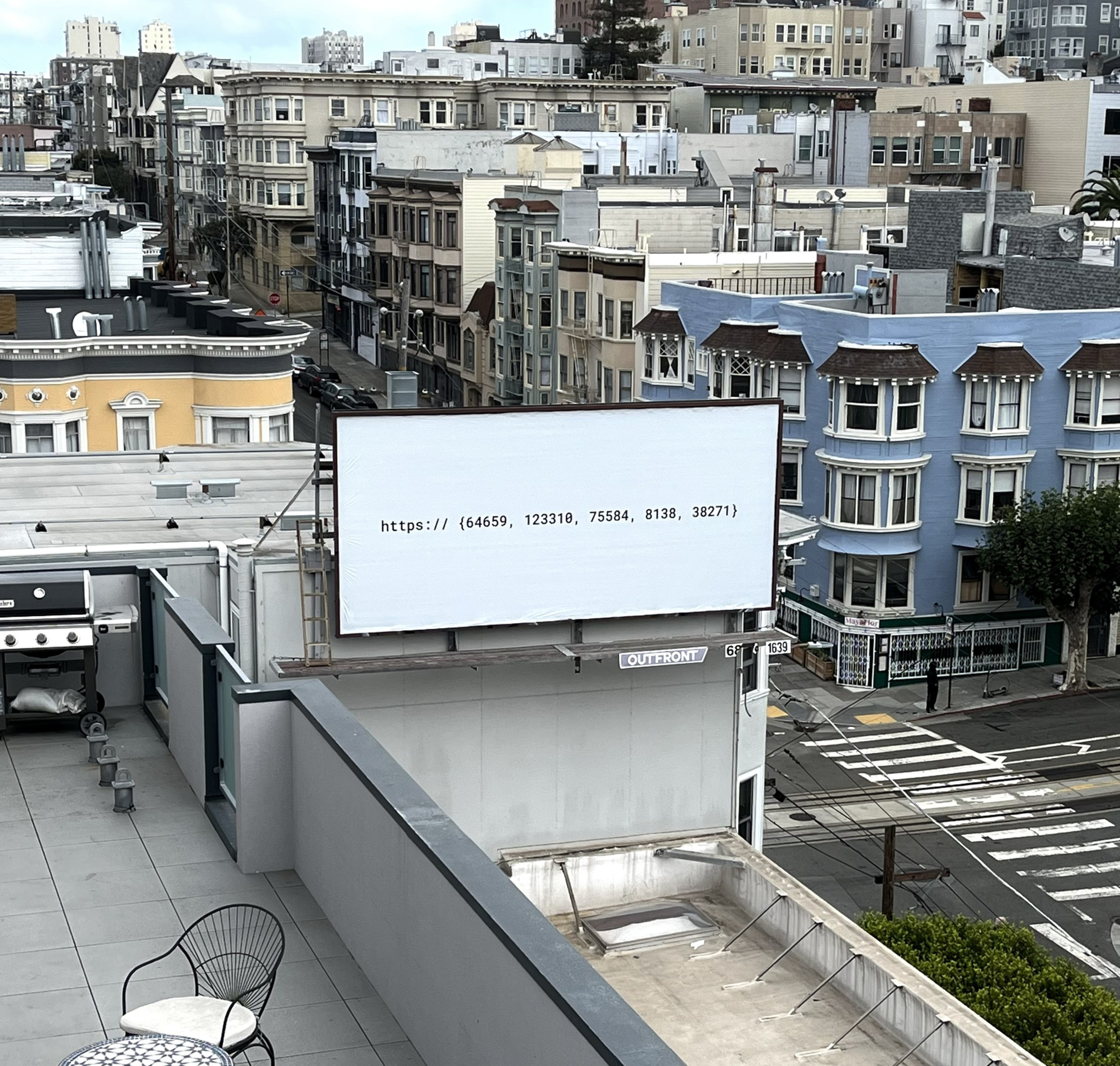What’s the connection between a German nightclub famous for sex-fueled dark rooms and San Francisco’s escalating AI talent wars?
It’s a cryptic billboard in Nob Hill that has sent the tech community into a puzzle-solving frenzy.
Last week, a plain white billboard surfaced on Larkin Street with a single line of black text. There’s no logo or slogan. Just “https://” (opens in new tab) and five clusters of numbers.
San Francisco’s AI nerds quickly realized the numbers were tokens, the basic building blocks of text that large language models (like ChatGPT) use to process and generate words.
More than 10,000 people have decoded the tokens back into text, revealing a website that lays out the real test: the “Berghain Challenge.” The test asks participants to design an algorithmic bouncer for the legendary German techno nightclub Berghain. Participants must fill the venue with 1,000 people while following rules like “at least 40% Berlin locals” or “at least 80% wearing all black.” For the player whose algorithm rejects the least number of people, the prize is an interview with the challenge’s creators at Listen Labs (opens in new tab) — and an all-expenses-paid night of debauchery in Berlin.

The test is an elaborate recruiting scheme masterminded by (opens in new tab)Listen Labs (opens in new tab), a little-known AI startup building a platform for conducting market research. Listen’s AI agent talks to customers on behalf of clients such as Google, Skims, and Nestle to figure out what they want to buy and why, promising comprehensive data in hours.
The Sequoia Capital-backed series A company raised $27 million (opens in new tab) this year but has been struggling to recruit top engineers amid a red-hot talent war in Silicon Valley, where Big Tech companies are dangling nine-figure pay packages (opens in new tab) in front of AI researchers.
“Recruiting has been hell,” said Listen Labs cofounder and CEO Alfred Wahlforss. “There’s a huge divide between engineers who can use AI and become 100 times more efficient and others who aren’t as plugged in.”
The Berghain Challenge is the company’s attempt to separate the wheat from the chaff — and to get top talent to show up on its doorstep instead of having to hunt them down.

The idea was hatched when Swedish-born Wahlforss, and his German cofounder, competitive programmer Florian Juengermann, were solving International Mathematical Olympiad (opens in new tab) puzzles at their South Park office for fun. That night, they’d been brainstorming creative ways to grow their company and had an idea to repackage their technical difficulties into a game that would bring them the best engineers in Silicon Valley.
The Berghain Challenge mirrors Listen’s core problem: how to choose the right individuals out of a crowd of thousands. Listen’s algorithm must essentially act like a digital bouncer, deciding which customers should be interviewed for market research. Listen is currently in the process of building and refining these algorithms, Wahlforss said, and wants to hire people who are interested in working on Berghain-like challenges in the real world.
More than 1,000 people have attempted the game; just 60 have solved it and been offered interviews at Listen.
“We were actually very worried before, because we sent the puzzle to a bunch of friends, and no one was able to solve it,” said Wahlforss, adding that they’ve been shocked by the millions of impressions (opens in new tab) photos of the billboard have received on X. Menlo Ventures partner Tim Tully is on the leaderboard, and OpenAI CEO Sam Altman replied “hi!” (opens in new tab) to a tweet asking how many people are both OpenAI tokenizer experts and want to be on the Berghain guest list.
“A lot more engineers than before are attracted to join Listen,” said Wahlforss, who plans to expand Listen’s workforce from 25 to 100 by next year.
The big question looming over the challenge is how Listen plans to get the winner into Berghain, which is legendary for its opaque and subjective “vibes-based” admission policy.
“My brother is the founder of SoundCloud, so we have some special connections that can help us get in,” said Wahlforss. He has already gotten on the Berghain guest list through his brother, Eric, and had a “very sweaty” experience at the club.
And if the job offer doesn’t work out, Wahlforss said, “at least you get a free trip to Berlin.”
